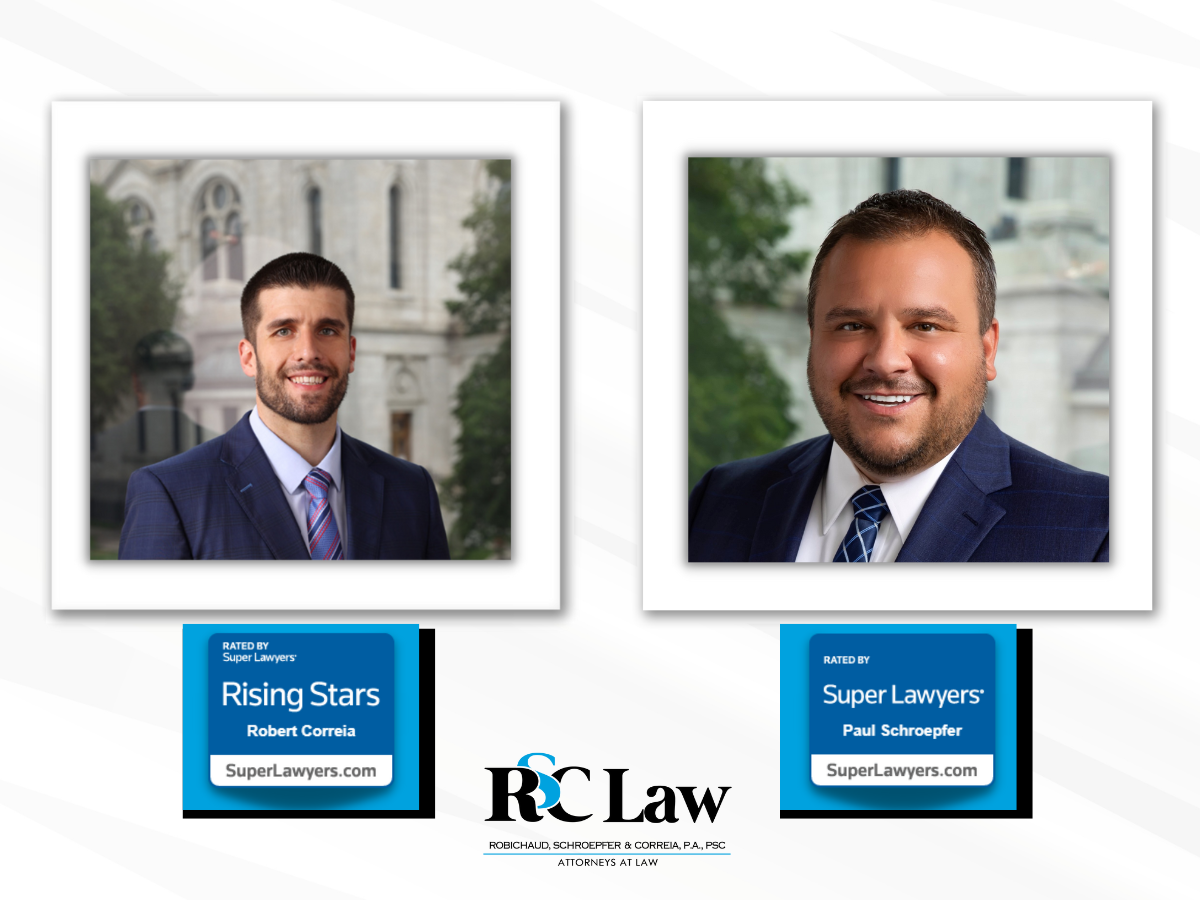Immigration Lawyers
At Robichaud, Schroepfer, and Correia, P.A., our immigration lawyers help individuals and families achieve U.S. citizenship with experienced legal representation and dedicated service.

Immigration Lawyers in Minneapolis, Minnesota
Are you navigating the complex and evolving landscape of immigration law? Our dedicated team of experienced immigration lawyers in Minneapolis is here to guide you every step of the way. Whether you’re seeking assistance with visas, green cards, naturalization, or deportation defense, we provide personalized and effective legal solutions tailored to your unique situation.
At RSC Law, we understand the significance of immigration matters and the impact they have on individuals and families. That’s why we combine our in-depth knowledge of immigration law with a compassionate approach to ensure that you receive the representation you need.
With a proven track record of success and a profound understanding of the local and federal immigration regulations, we are well-equipped to handle even the range of cases — from those that are straightforward to immigration situations that are especially intricate. Contact us today to request a consultation. Let us be your trusted advocates as you pursue your immigration goals.
Our Immigration Lawyers Provide Immigration Services in the Following Areas
At RSC Law, we have extensive experience representing clients throughout the United States in a wide variety of immigration services and practice areas, including:
- Family-Based Green Cards
- Citizenship
- Fiance(e) and Spouse Visas
- Asylum
- Work Authorizations
- Visas for Victims of Crime
- Deportation Defense
- Immigration Appeals
- Deferred Action
- Waivers
- Religious Visas
- TN Visas
- 0-1 Visa: Individuals with Extraordinary Ability or Achievement
Things to Know About the Immigration Process
At RSC Law, we understand that navigating the complexities of U.S. immigration law can be overwhelming. Having an experienced attorney is crucial to the success of your immigration case. An experienced attorney will be able to guide you through the immigration process, and help you avoid common pitfalls that can cause unnecessary denials or delays. Whether you are facing deportation, or seeking to adjust your status, our experienced immigration attorneys understand the importance of your case. Here are some of the types of cases we handle:
U.S. Citizenship and Naturalization
Naturalization is the vehicle whereby people born outside the United States or to parents who are U.S. citizens may become eligible for citizenship. However, due to its complexities, it’s wise to seek legal help from an experienced immigration lawyer.
USCIS (United States Citizenship and Immigration Services) has specific requirements for citizenship, including:
- Permanent residency for five years if not married to a U.S. citizen
- Permanent residency for three years if married to a U.S. citizen
- Limitations on the amount of time outside the United States
- Evidence of good moral character
- Ability to pass an English and Civics exam
Seek legal advice from a skilled immigration attorney, especially if you travel frequently or have a criminal record. Our knowledgeable immigration lawyers can address any travel or criminal issues and determine if now is the right time for you to apply.
Family-Based Immigration
If you are the spouse, parent, or child of a U.S. citizen or U.S. resident, you may be eligible for a green card. Our experienced attorneys can determine if you qualify to become a permanent resident through your family member.
Visas for Victims of Crimes
If you are a non-citizen and have been the victim of a crime, you may be eligible for a visa that could allow you to become a permanent resident in the future. This type of visa waives or forgives many things that would otherwise prevent you from gaining lawful immigrant status. Our immigration attorneys can help determine if you qualify for a U visa.
Special Immigrant Juvenile Status (SIJS)
If you are a noncitizen under the age of 21, you may be eligible for special immigrant juvenile status, often referred to as “SIJS.” To file an SIJS petition, the law requires that a state court judge find that it is not in your best interests to be reunited with one or both of your parents due to abuse, abandonment, or neglect. SIJS allows you to eventually apply for a green card. Our immigration attorneys can assist with both the state court and immigration processes for SIJS.
Visas for Religious Workers, Skilled Workers, and Investors
We handle certain visa applications for religious workers, and some other types of skilled workers.
Asylum and Deportation Defense
If you are in removal proceedings in the immigration court, you need an experienced attorney who can fight for you to remain in the United States. Our immigration attorneys handle many types of immigration court cases, including asylum, cancellation of removal, and more.
Regardless of your immigration status, our comprehensive legal services cover multiple aspects of immigration law. From our Minneapolis office, an attorney will provide answers to your questions, listen to the details of your unique case, strategize an approach, and offer you experienced and dedicated legal representation from start to finish.
To us, you are not just another file number; you are a valued client who is to be provided the utmost care and attention. Contact us at (612) 333-3343 or complete our online form to schedule a consultation.
We’re here to help.
Frequently-Asked Questions Regarding Immigration in Minnesota
What Is a Visa?
Put simply, a visa is a travel document that enables its owner to apply for entry to the United States. The type of visa you need depends upon your reason for visiting the U.S. It’s important to understand that a visa does not not necessarily give permission for you to enter the United States. Customs and Border Protection officers review visas and details such as the length of your visit, your reason for your stay, and the conditions of the visit before deciding whether to allow you to enter the U.S. as a non-citizen.
How Does the Visa Process Work?
There are two types of visas: a non-immigrant visa for temporary visits and an immigrant visa for individuals with plans to live in the U.S. permanently. The United States classifies visas based on the purpose of your visit. For example, an athlete must apply for a B-1 visa, while a temporary worker must secure an H visa.
The type of visa you receive might also require additional approvals from other agencies such as USCIS or an employer, if you are a temporary worker. Visa applicants must also pay fees and participate in a visa interview.
Do I Need a Sponsor?
Yes, in the majority of cases, having a U.S. citizen, U.S. lawful permanent resident, or an employer sponsor you for immigration to the U.S. is the first step in your immigration journey. Although there are a few exceptions to this rule, it’s usually safe to assume that immigrants looking to come into the United States will need sponsors.
What Is Family-Based Immigration?
Family-based immigration allows United States citizens and lawful permanent residents to sponsor specific family members to bring them into the country. If applying through the family-based category, individuals coming into the US are classified as either immediate relatives or as part of the family preference system. The immediate relatives classification applies to spouses, children under 21 years of age, or parents of American citizens. Adult children, brothers, and sisters of citizens and spouses and children of lawful permanent residents are part of the family preference system.
What Is Employment-Based Immigration?
Employment-based immigration allows an immigrant with employable skills sought by businesses to enter the United States either temporarily or permanently. Businesses can use many types of temporary visas to hire people from outside the United States for specific roles over a limited amount of time. This stipulation can mean that the employee has a limited ability to switch jobs; therefore, the majority of individuals on an employment-based visa would have to leave the United States when their employment ends.
What Is Refugee Status?
USCIS defines refugee status as protection for individuals unable to return to their home country due to persecution based on race, religion, nationality, social group membership, or political beliefs.
What Is Asylum?
Asylum is a way to seek refuge in the United States if you face persecution in your home country. You may qualify for asylum or other forms of protection if you face persecution for one or more of the following:
- Political opinion
- Religion
- Race
- Ethnicity
- Membership in a group, which includes many different reasons for persecution
Victims of domestic abuse and female genital mutilation can also seek protection. Whether the persecution comes from the government or a group the government cannot or will not control, individuals may apply for asylum. Act quickly; in the majority of circumstances, asylum applications must be submitted within one year of entering the US. Reach out to an immigration attorney at RSC Law to see if we can still assist you even after this deadline.
How Do I Apply for Refugee Status?
To seek refugee status in the U.S., individuals must first be referred by the U.S. Refugee Admissions Program (USRAP). If accepted, applicants undergo screening, an interview, and a medical exam before being provided assistance with travel plans and loans. Additional support like cultural orientation and financial aid is provided if necessary. Only 1% of refugees worldwide are referred to the U.S. through this process.
An individual applying for refugee status in the United States must secure a referral from the USRAP (U.S. Refugee Admissions Program). Upon acceptance, they are assisted with their application and participate in an interview with an officer from the USRAP to determine eligibility. As soon as they are approved to enter the United States, refugees undergo a medical examination and are provided cultural orientation, assistance with travel, a loan, and, if needed, additional medical and financial support.
Depending on the individual’s country of origin, they may be subject to additional screening such as iris scans, if the country has connections to terrorism. Additionally, more than six other U.S. agencies, including the FBI and National Counterterrorism Center, review these cases. Expect the process to take anywhere from 18 to 24 months. Approved applicants must apply for a green card within one year.
What Is a Green Card?
The United States issues a green card for permanent residents who are not U.S. citizens. It enables an individual to live and work in the country legally.
How Do I Secure a Green Card?
A person can become eligible in three primary ways:
- Family — immediate relatives or family members of a U.S. citizen or green card holder. An immediate relative can earn priority status.
- Employer — noncitizens can earn green cards through either a permanent position with a U.S. employer or by investing in or starting an enterprise that leads to U.S. jobs
- Refugee or Asylee Status — This pertains to individuals who have fled their home countries due to persecution, war, or violence that have demonstrated a well-founded fear of persecution based on race, religion, nationality, political opinion, or membership in a particular social group, and have achieved refugee status. Asylees, already present in the U.S. or at a port of entry, that have successfully sought protection based on the same criteria as refugees can secure green cards.
How Do Individuals with Green Cards Become U.S. Citizens?
If you’ve had a green card for five years and are in good standing, you can apply for U.S. citizenship. Fill out forms, have your biometrics taken, then pass an English and civics test during an interview. If you need a retest, you must wait 60-90 days. Once you pass, you can take the Oath of Allegiance and officially become a citizen.
Contact Us Today
For A Free Consultation
Call Now (612) 333-3343
Free consultations are available for personal injury and workers’ compensation cases. For the convenience of our clients, we speak Spanish, Vietnamese, and Somali.
We respect your privacy. The information you provide will be used to answer your question or to schedule an appointment if requested.
Why Choose Robichaud, Schroepfer and Correia, P.A.?
We have offices in Minneapolis, MN, and Louisville, KY, catering to all walks of life. Our clients place trust and confidence in our well-established law firm because we always put our clients first:
- A proven track record both inside and outside the courtroom.
- Clients are the boss. You’ll know the strategy and options. We guide and you decide.
- You will know we are fighting for you based on an understood game plan.
- You are not just a file number; we provide the individualized attention you deserve.
- We accommodate clients from all cultures in a variety of languages.
- We provide the strengths and benefits of a big law firm combined with the small-firm care and accessibility you deserve.
- We guide you in your case from start to finish to achieve the best outcome possible.
Our actions speak for us; contact us today to schedule a free consultation.
News & Resources

RSC Law Announces the Hiring of an Experienced Immigration Attorney
MINNEAPOLIS, Minnesota—RSC Law proudly announces the hiring of Associate Attorney Evangeline Dhawan-Maloney. Evangeline brings a…

RSC Law Announces Super Lawyers Selections for Two Attorneys
MINNEAPOLIS, Minnesota—RSC Law proudly announces that attorneys Paul Schroepfer and Robert Correia have been selected…

Personal Injury Attorney Robert A. Correia Named Attorney of the Year
MINNEAPOLIS, Minnesota—Robert A. Correia, Shareholder and Lead Attorney of Robichaud, Schroepfer & Correia, P.A., has…



